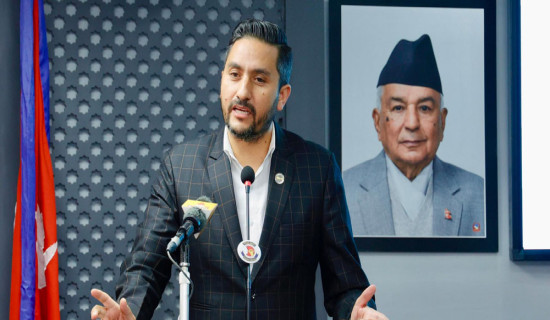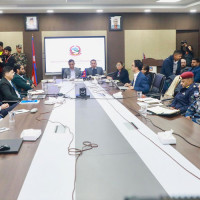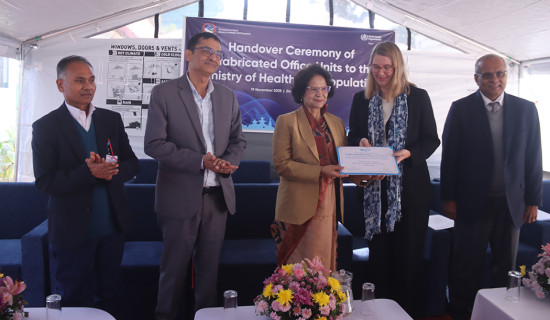- Wednesday, 19 November 2025
Govt's 100-day achievements unveiled
Good governance principal thrust: PM Oli
By A Staff Reporter,Kathmandu, Oct. 24: Prime Minister KP Sharma Oli has said that actions would be taken against individuals involved in corruption, regardless of when the offenses took place.
In a speech marking the completion of 100 days in office, Prime Minister Oli said that the government is committed to ensuring that corruption control and good governance are not just publicity stunts, but rather expedited as part of a systematic approach to good governance.
“In addressing corruption control, the government views the law as the guiding principle rather than aiming publicity,” he said adding, the focus is not on creating rumours about capturing the corrupt, which could ultimately lead to an increase in corruption.
“Instead, the priority is to establish a legal framework that effectively controls corruption,” he added.
He said initiative has been taken to punish those misappropriating the deposits of the common people in the cooperatives.
“So far, over 600 have been punished, while 575 are serving their prison terms,” said Prime Minister Oli.
“Efforts are underway not only to prosecute cooperative fraudsters but also to formulate the Cooperative Authority Act, which is essential to refund the deposits of the common people. Additionally, a Cooperative Credit Information Centre and a Debt Recovery Tribunal are being established,” he added.
Prime Minister Oli also highlighted the government’s commitment to the people and its progress on key initiatives despite facing significant challenges, including natural disasters.
He claimed that 70 per cent of the government’s targeted goal were completed in the first 100 days, with a high priority to complete the ongoing projects on time.
Prime Minister Oli said in the first 100 days, the government prioritised and planned the completion of various tasks under different ministries, signing performance agreement between the Prime Minister and the ministers.
“A total of 274 tasks were identified, with 185 completed, executing approximately 70 per cent of the planned work. If circumstances had been more favourable, the government could have completed the remaining 30 per cent as well,” he said.
The Prime Minister reflected on a series of tragic incidents, including severe floods and landslides that led to 7,135 catastrophic events across the country.
The Prime Minister also addressed the impact of recent natural disasters, including floods and landslides that affected thousands of families across the country.
In response, the government prioritised immediate rescue efforts, providing financial support and essential services to those impacted, he added.
“Relief packages amounting to Rs. 20,000 have been distributed to families of 391 flood victims, and Rs. 45 million was allocated to support 2,555 affected families, while Rs. 43 million has been allocated to 71 local levels in crisis-hit areas,” he said.
He underscored the importance of the government being built on the faith and trust of the citizens, noting that the administration is dedicated to fulfilling the hopes and aspirations of the people.
Prime Minister Oli also acknowledged the challenges posed by recent calamities, including the disruption of infrastructure and the anxiety it caused among the public.
However, he reassured citizens that the government acted swiftly to restore transportation routes and ensure access to essential services.
In addition to immediate disaster response, the government aims to commence reconstruction efforts for areas affected by last year’s earthquake, he noted.
The government has decided to complete the detailed damage assessment (DDA) and allocate the necessary budget within 15 days to initiate the reconstruction of permanent private housing, he added.
“The goal is to restore stability and security to the lives of those affected,” said PM Oli.
He said, “The reconstruction of houses damaged by last year’s earthquake will now proceed alongside the housing efforts for citizens affected by this year's floods and landslides.”
He also underscored the importance of resilience and support for farmers, noting that nearly 1.5 million dairy farmers have received overdue payments during the initial phase of the government.
According to him, the government has allocated Rs. 600 million for this purpose.
Additionally, around 75,000 sugarcane farmers, who had not been paid for their hard work for years, have also received their subsidy payments, the Prime Minister informed.
Moreover, thousands of farmers participating in agricultural crop and livestock insurance can breathe a sigh of relief, as Rs. 800 million has been deposited into the insurance authority’s account for settling insurance claims.
Similarly, arrangements have been made for the chemical fertilisers needed for winter crops.
“In Parliament, we pledged to pay construction companies that had not received timely payments after completing their projects, with the disbursement of Rs. 6.75 billion from federal ministries during this period,” he added.
He said one of the key priorities during his vote of confidence was the promotion of entrepreneurship.
“In response to concerns about the lack of opportunities for young people, the Ministry of Industry has provided collateral-free start-up loans of up to R. 2.5 million to 165 youths, who have already launched their businesses and begun repaying their loans,” he said.
Additionally, 5,158 entrepreneurs have applied for similar loans, with plans to select and provide funding to new start-ups by the end of Poush.
He claimed that when the government took office, the economy was in turmoil, but signs of improvement have emerged.
The establishment of the Economic Advisory Commission, aligned with private sector demands, has boosted business confidence, leading to investment commitments of around Rs. 34 billion in 200 industries over the 100 days.
Nepal’s sovereign credit rating process by an international body is nearing completion, and the stock market has shown progress despite natural disasters.
An agreement between Nepal Oil Corporation and Indian Oil Corporation aims to expand pipelines from Siliguri to Charaali and from Amlekhganj to Lothar, enhancing Nepal’s petroleum supply and storage capacity. Additionally, the Nepal Accreditation Centre has been set up to ensure the quality of goods, services, and processes across the country, he claimed.
By the end of Ashoj of the current fiscal year, federal government spending increased to Rs. 329 billion, with revenue rising by 13.3 per cent totaling Rs. 248 billion.
The government prioritized aiding citizens in poverty by arranging free non-cosmetic burn treatment in all seven provinces through designated hospitals, including BP Koirala Institute and Kirtipur Hospital.
Additionally, cancer treatment services, once available only in three provinces, have been expanded to all seven.
To improve healthcare access, outpatient services now operate in two shifts at 19 federal hospitals, with a token system implemented in 18 hospitals, he informed.
He outlined various reforms aimed at improving public administration and service delivery.
Drivers can now get licenses through a citizen app, and fines for rule violations can be paid on the spot. Soon, all government services will be accessible from home, eliminating office visits. A QR code system is being tested to track file movement in government offices, and foreign investments up to Rs. 50 million can now be processed automatically, he added.
Online service tracking has been launched in 58 survey offices, while senior citizens and disabled individuals no longer need to wait in line at 267 post offices.
Compensation for families of Nepalis who died abroad has been increased to Rs. 1 million, with new provisions for undocumented workers to apply for work permits, the Prime Minister said.
The government is also optimizing the use of underutilised airports in Bhairahawa and Pokhara by lowering fuel costs, with Fly Dubai and Jazeera Airways starting flights soon.
Kirtipur Cricket Stadium is being upgraded with floodlights for night matches, and a deal has been signed to export 40 MW of electricity to Bangladesh.
Meanwhile, the government has achieved significant progress in the breakthrough of the Dhedre tunnel along the Kathmandu Terai/Madhes Fast Track Project in Makwanpur undertaken by the Nepali Army. The lining of the main Nagdhunga tunnel has also been successfully completed.
Remarkable progress has been made in the Siddhababa tunnel in Rupandehi, where 396.85 metres of the tunnel was excavated within just 100 days, and a total of 647 metres has been excavated so far.
In the field of road construction and maintenance, significant achievements have been made. In the past 100 days, 4,038 kilometres of roads have been repaired, and 32.5 kilometres of roads have been blacktopped, making transportation smoother and safer.
Though it may seem like a small issue, it holds great significance for certain areas. Among the 753 municipalities across the country, Saipal Rural Municipality was the only local government without access to financial institutions.
However, with the establishment of a commercial bank branch in this technically challenging area, around 3,000 people from 500 households now have direct access to banking services.
Similarly, Humla district was the only district where the 'Fiber to the Home' (FTTH) service had not yet reached. But since the service was launched in August, it is now available in all 77 districts, marking the beginning of a new era of digital connectivity in remote areas.
Similarly, during this period, more than four dozen laws, regulations, and procedures related to various ministries have been approved.
The government has also succeeded in bringing the remaining tasks of the peace process, initiated 17 years ago, to a final conclusion. In this regard, the bill to amend the 'Truth and Reconciliation Commission Act, 2071' has been unanimously approved and certified. A recommendation committee for the reconstitution of the commission has been established, and the process of forming the commission has begun.
The government has also claimed that the government had advanced neighborhood relations based on mutual benefit and respect, standing firmly on just national interests.
"We are concerned about the violence and tension in various parts of the world and seek peaceful solutions to all these tensions through negotiations. We believe that everyone should work prudently toward the establishment of peace," the Prime Minister said.
"Currently, attempts are being made to disrupt our national unity and lead us backward by creating an atmosphere of communal hatred, animosity, and discord. However, regression is unacceptable to Nepal and the Nepali people under any circumstances. The government will protect the constitution, which is designed to strengthen democracy," said the Prime Minister.
"Rumours are also being spread that the government will topple instantly, today, or tomorrow morning. These are just rumours spread with the intention of preventing work. It will just be a daydream that the government will collapse that is formed by parties like Congress and UML, which have such history and stature," he said.
The government needs cooperation of the civil servants to succeed in our work, he said. The bureaucracy has the primary responsibility to extend the government’s priorities to the lives of citizens.
"I have refuted these claims, as it is the employees who are responsible for doing the work. The Chief Secretary and Secretaries, who lead the bureaucracy, are present here. I am sure they agree with me—political leadership sets out policies and priorities, and the civil administration implements them," said PM Oli.
He said that the first 100 days are just over, and from today, we start implementing plans for the next hundred days and beyond.

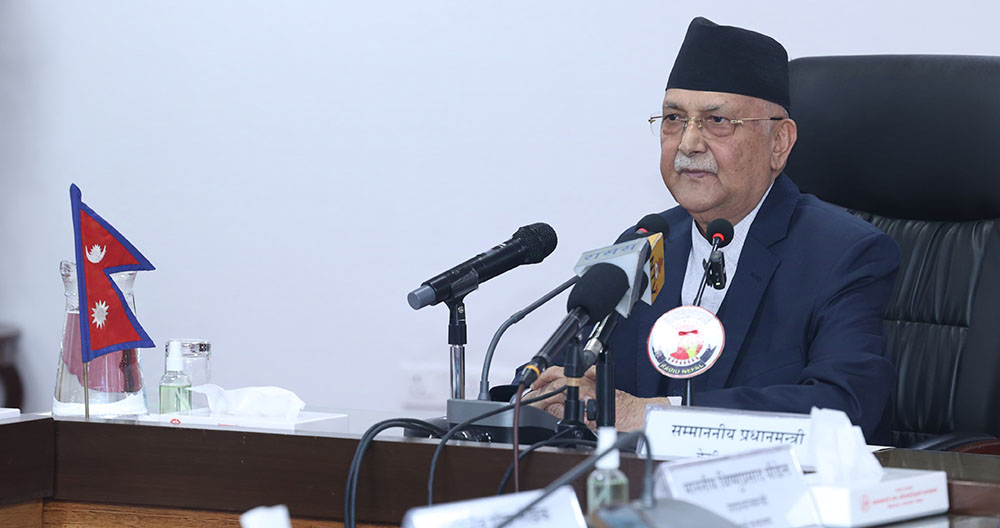


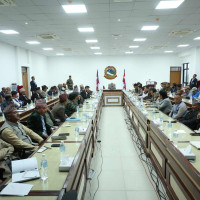
-square-thumb.jpg)
